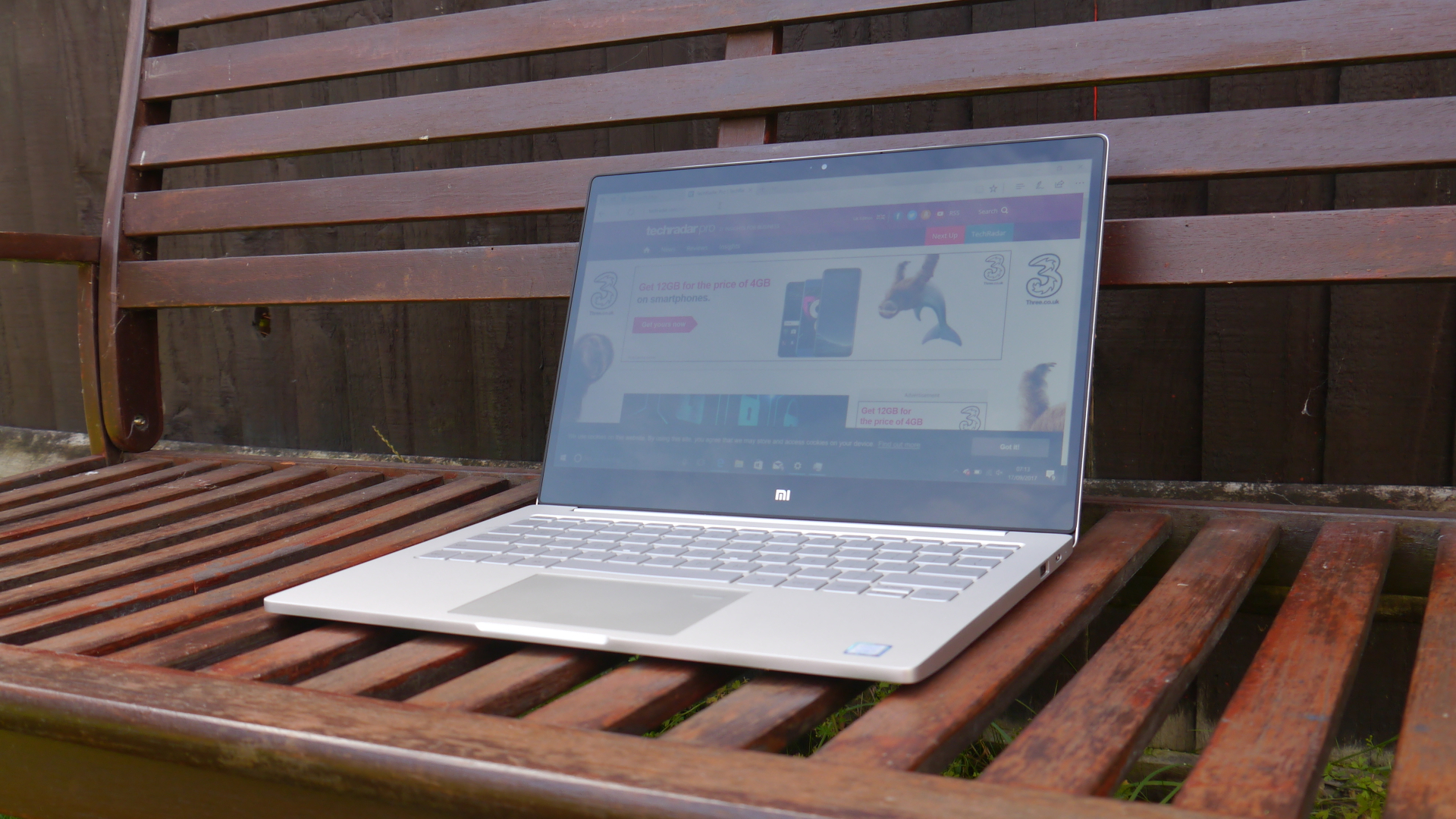Why you can trust TechRadar
Usage and performance
It's worth noting that this laptop currently comes with the Chinese version of Windows 10 Home. Gearbest does not offer a trial (non-activated) English version of Windows 10 which allows you to buy a license as it did previously. This isn't ideal as it adds to the cost of the machine – you can track the cheapest Windows 10 deals here.

We had to install an English version of Windows 10 in order to run our benchmarks correctly. The results produced by the Xiaomi Mi Notebook Air 13.3 were largely in line with our expectations, with a few distinct highlights.
Here’s how the Xiaomi Mi Notebook Air 13.3 performed in our suite of benchmark tests:
Passmark: 2981
Passmark CPU: 4808
CPU-Z: 1493 (single-thread); 3462 (multi-thread)
Geekbench: 3720 (single-core); 7143 (multi-core); 16347 (compute)
Cinebench: OpenGL: 74.47 fps; CPU: 336
CrystalDiskMark: 3356 MBps (read); 1364 MBps (write)
Novabench: 1163
Atto: 3189 MBps (read, 256mb); 1364 MBps (write, 256mb)
Sisoft Sandra (KPT): 8.49
Windows Experience Index: 5.5
UserBenchmark (higher is better): 76
Geekbench compute and Cinebench OpenGL scores were far better than expected because of the dedicated Pascal-based GeForce MX150 GPU with 2GB GDDR5 RAM. Likewise, the NVMe SSD from Samsung delivers stellar numbers – some of the best results we’ve witnessed from a single drive.
The IPS display, which boasts a protective glass made of sapphire, produces bright, crisp pictures with good viewing angles and decent saturation levels. Sadly, the glossy finish makes it near impossible to read in bright sunlight.
Our biggest complaint, though, has to be the noise level especially when under load. The Notebook Air 13.3 is certainly a noisy customer and we blame this on the dedicated GPU. The laptop warms up and although we haven’t stress-tested the machine, we wonder whether the device will throttle – and potentially shut down – when it becomes too warm.
Battery life is not too shabby at just over five hours, which is acceptable for a laptop with a dedicated GPU, but far below the eight hours suggested by Xiaomi.
The fingerprint reader works as promised, offering fast unlocking of the laptop, while the sound quality of the AKG speakers is one of the better audio experiences we’ve heard on an Ultrabook. Note that there’s no SD card slot which may put off some potential buyers.

Competition
As we mentioned at the outset of this review, remember that you are likely to be hit with a sizeable fee when buying (and importing) the Xiaomi Mi Notebook Air 13.3 laptop from Gearbest. So what other compelling options are available?
The HP Pavilion x360 2017 Edition comes with a more powerful quad-core, 8th-generation Core i5 CPU, and a similar feature set minus the dedicated graphics card and fingerprint reader. You do get a touchscreen display with the HP model, though, not to mention Windows 10 in English, and you can optionally insure this convertible laptop for three years for £49 ($65). At just under £750 ($1,010) at the time of writing, it is a better deal in our books.

At just under £680 ($920) – including a £70 cashback – the Dell Inspiron 13 5000 (2016) convertible laptop adopts the same set of components as its main competitors, but is pegged at a lower price point. Note that a newer model, the Dell Inspiron 13 5379, can be had for around £750 ($1,010) direct from Dell at the time of writing, and this has a newer, more powerful CPU.
Another alternative is the sub-£600 ($810) Medion Achieve S3409 which shares the same specifications as its competitors, but like the Xiaomi Mi, it’s pegged as a traditional, bog standard laptop rather than one that morphs into a tablet. Note that Medion is a Lenovo brand and the S3409 is bulkier than its rivals.

Final verdict
The Xiaomi Mi Notebook Air is a superb laptop on many levels, boasting a superb design, impressive performance levels, and slick additions like a fingerprint reader.
It’s not without flaws, though, such as the cooling system and the noise this makes. Indeed, one might question the benefit of adding a dedicated graphics card to a product that’s not gaming oriented. You could also argue that Xiaomi should have shunned the glossy finish of the display; this isn’t a touchscreen after all.
Beyond all these considerations, though, is the question of aftersales and Windows 10. Xiaomi doesn’t sell the laptop in the UK through the usual channels, which means that defective laptops have to be sent all the way to China and back with the customer having to foot the bill (and expect a refund).
While we wouldn’t have balked at this scenario for cheaper devices, the thought of sending away a £700 ($950) notebook – possibly our main computer – and waiting for it to come back after a few weeks is something we cannot really contemplate.
To make things worse, this laptop ships with Windows 10 in Chinese; changing the language as suggested by some will not remedy anything. Instead, you need a new version of Windows altogether, which will add about £90 ($120) to the total price of the Xiaomi Mi Notebook Air 13.3.
The business user is likely to sidestep this laptop because of the hassles involved in installing a new version of Windows 10, and the potential trouble of having to ship the machine to the other side of the world for repairs – and all the implications of having potentially sensitive data in transit.
- We’ve picked out the best business laptops of 2017

Désiré has been musing and writing about technology during a career spanning four decades. He dabbled in website builders and web hosting when DHTML and frames were in vogue and started narrating about the impact of technology on society just before the start of the Y2K hysteria at the turn of the last millennium.
